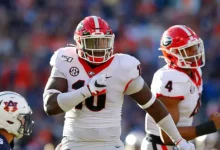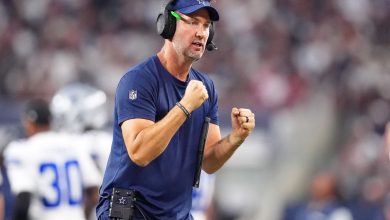Dabo Swinney responds to Brian Kelly’s comments on LSU being the real Death Valley

When it comes to college football rivalries, few things stir the pot like a bit of friendly (or not-so-friendly) banter between head coaches. The latest chapter in this saga came when LSU head coach Brian Kelly made comments suggesting that Tiger Stadium in Baton Rouge, Louisiana—famously known as “Death Valley”—was the true “Death Valley” in college football. This was, of course, in contrast to the claim made by Clemson head coach Dabo Swinney, who has long referred to his home field, Memorial Stadium, as “Death Valley” in honor of its raucous atmosphere and the intimidating presence of the Tigers on their home turf.
The debate over who truly owns the “Death Valley” moniker isn’t just about geographical semantics; it’s about pride, history, and the culture surrounding two of college football’s most storied programs. Both teams have been at the pinnacle of success in recent years—LSU winning the national championship in 2019 and Clemson following up with its own title in 2016 and consistently being a powerhouse in the ACC under Swinney.
Swinney’s response to Kelly’s comments, like most things with the Clemson head coach, was measured but firm. He didn’t back down from the tradition that Clemson has cultivated over the years. His words were clear: Clemson’s Death Valley was earned long before LSU was making its own claim.
Before diving into the present-day back-and-forth between Swinney and Kelly, it’s essential to understand the origins of the “Death Valley” nickname, as it holds historical significance for both schools.
For Clemson, the “Death Valley” moniker has been an integral part of the program since the 1940s. The term was first coined by visiting players from the University of Miami who, after suffering a tough loss to the Tigers, likened the atmosphere at Clemson’s Memorial Stadium to the afterlife. The stadium’s combination of noise, the fervor of its fans, and the home-field advantage created a hostile environment that made it feel like a “deathtrap” for opposing teams. The name stuck, and since then, it has become synonymous with Clemson football and the Tigers’ intimidating presence in the ACC.
Meanwhile, LSU’s Tiger Stadium in Baton Rouge also earned the nickname “Death Valley” due to the intense environment and the challenges visiting teams faced in playing in one of the loudest stadiums in college football. The phrase “The real Death Valley” has been a long-running refrain for LSU fans, who believe that their stadium’s rowdiness and reputation as a tough place to play deserve the original claim to the name.
While both schools claim the title, the rivalry over the nickname gained more national attention after LSU’s success in recent years, particularly under Brian Kelly. Kelly’s comments, though somewhat playful, ignited the conversation once again.
The remarks from Brian Kelly came during a media session in which he was discussing his own program’s environment. “I’m not here to take shots at anyone,” Kelly said with a smile, “but the real ‘Death Valley’ is right here in Baton Rouge. If you’ve been to Tiger Stadium, you know what I’m talking about. The atmosphere is unlike anything in college football, and there’s a reason we call it ‘Death Valley.’ It’s earned.”
Kelly’s comments were lighthearted in tone but spoke to LSU’s pride in its own football program and the reputation that Tiger Stadium has cultivated over decades. LSU fans, known for their intense support of the team, quickly rallied behind their coach’s words, taking to social media and message boards to reinforce their claim as the “true” Death Valley.
For LSU, Kelly’s remarks weren’t just a matter of pride; they were a subtle assertion of dominance in the larger conversation about college football’s elite programs. LSU had long been known for its tough environment, particularly in night games when the stadium reaches a fever pitch. The Tigers’ success on the field, coupled with the legendary atmosphere at Tiger Stadium, made Kelly’s claim about “Death Valley” seem more than just a casual comment—it was a statement of purpose and tradition.
As expected, Dabo Swinney didn’t take kindly to Kelly’s assertion that LSU’s Tiger Stadium was the real “Death Valley.” But, true to form, Swinney responded with a balance of humor, respect, and confidence. Swinney’s answer wasn’t an outright confrontation; instead, he subtly reminded everyone of the history and traditions that have shaped Clemson football.
“Well, it’s great to see the LSU folks taking some pride in their home-field advantage,” Swinney said in a press conference shortly after Kelly’s comments. “But I’ll tell you this, the real Death Valley has been at Clemson for a long time, and I think the history speaks for itself. The players who have come through here, the national championships we’ve won, and the atmosphere we create—it’s unique. It’s not something that you can just claim because of a few loud nights.”
Swinney continued, “There’s no disrespect to LSU, but the ‘Death Valley’ name has been ours for decades. And let’s be real—if you’re going to make a claim, it’s not just about noise. It’s about the culture, the tradition, and the belief that when you step into that stadium, it’s going to be a battle. And we’ve been doing that for a long time.”
Swinney’s response was both respectful and resolute. He acknowledged LSU’s success and the intensity of their fans but pointed to Clemson’s historical claim to the nickname. His response wasn’t an insult to LSU or Kelly; rather, it was an assertion of Clemson’s own legacy and the significance that Memorial Stadium holds in the minds of its players, coaches, and fans.
Both LSU and Clemson boast incredible home-field advantages, and the “Death Valley” debate isn’t just about a catchy nickname—it’s about what that nickname represents: the intensity of a college football environment that can intimidate opponents and fuel the home team’s success. Both Tiger Stadium in Baton Rouge and Memorial Stadium in Clemson are known for their rowdy, passionate crowds, and both places can create an electric atmosphere that makes opposing teams feel like they’re stepping into hostile territory.
For LSU, Tiger Stadium’s “Death Valley” legacy is built on decades of loud, raucous crowds that make it one of the most challenging venues in college football. The tradition of night games, in particular, is legendary, as the crowd is often at its loudest and most energetic during those prime-time matchups. That’s why Kelly’s comments, while playful, came with a kernel of truth. When LSU is rolling, it’s one of the most difficult places to play in all of college football.
Clemson, on the other hand, has its own unique atmosphere at Memorial Stadium. While it may not have the same decades-long reputation as Tiger Stadium, the Clemson fanbase has built an identity around being fiercely loyal and extremely loud during home games. The “Clemson Family,” as it’s often referred to, rallies behind the Tigers in a way that creates a near-impenetrable fortress. Under Swinney, the team has become a consistent contender for national championships, and the culture of winning has only added to the mystique of Memorial Stadium, making it a place where opponents dread playing.
At the end of the day, the back-and-forth between Swinney and Kelly is all in good fun. Both LSU and Clemson have earned their places among college football’s elite programs, and each fanbase has a deep connection to their respective home stadiums. The “Death Valley” debate is less about claiming superiority and more about celebrating the unique environments that both schools have cultivated over the years.
While LSU’s Tiger Stadium may have the history of being the original “Death Valley,” Clemson’s Memorial Stadium has carved out its own place in college football lore, with an atmosphere that has helped propel the Tigers to the top of the sport in recent years. Both stadiums are steeped in tradition, and both provide an environment that any visiting team would love to avoid.
Whether it’s LSU’s Tiger Stadium or Clemson’s Memorial Stadium, the “Death Valley” nickname has become more than just a title—it’s a symbol of the fierce pride that both programs have for their home field, and the passion of their fans. As long as Dabo Swinney and Brian Kelly are at the helm, the rivalry between these two teams will continue to grow, and the debate over which “Death Valley” is the real one will carry on—adding even more fire to one of the most compelling rivalries in college football.









